Apparently when it was suggested to build a Home Computer, the trade analysts predicted that there would be a demand for only 2 PCs a year. Times have flown and look where we are now! In a family of four with modest means, we own 2 desktops and 2 Laptops! The point is, we have seen many creative concepts in laptops and PCs on YD over the years. Agreed many are farfetched, but dreaming big is a part of the creative process. Here is a look at Ten Futuristic Computer Concepts that we hope get realized.
10) MacBook Touch by Tommaso Gecchelin
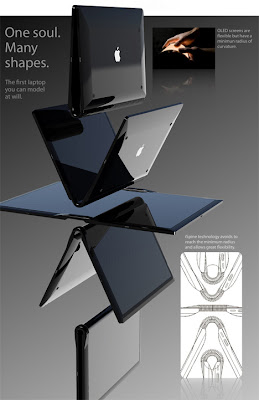
Highlights: flexibility in form-factor via iSpine technology, flexible OLED screen, and Magic Dock that externalize ports to keep the appearance clean.
9) HP LiM (Less is More) Concept by Jeffrey S. Engelhardt
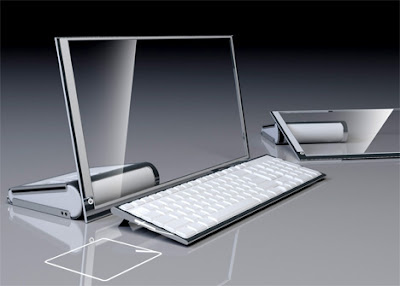
Highlights: use of Bamboo fabric across the aluminum frame of the PC, 19″ transparent touch OLED screen along with a wireless keyboard, virtual trackpad.
8 ) Evolve Modular CPU by Vas Obeyesekere of Point Innovation

Highlights: transforms between mobile and home computing configurations and can expand or contract its module based components to meet any user’s needs.
7) Mac Folder by Tryi Yeh

Highlights: a re-worked User Interface that resembles the iPod Touch or iPhones’, super-slim multi-touch screen.
6) Dual Screen Computer by Yong-Seong Kim
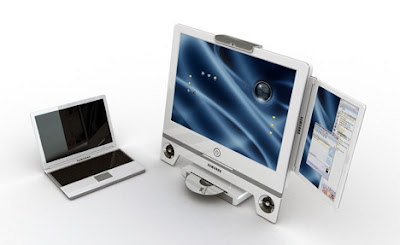
Highlights: a large slot behind the LCD display that can accommodate the notebook thus allowing you to use it as a desktop, notebook’s screen transforms into a second display in portrait mode.
5) Canvas by Kyle Cherry
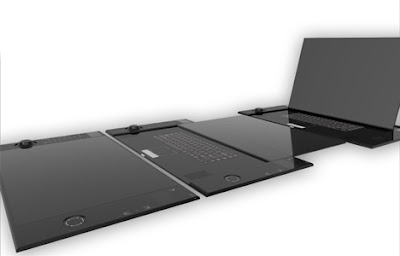
Highlights: designed for those in the creative arts fields, offers a wide are for workspace.
4) The Napkin PC by Avery Holleman
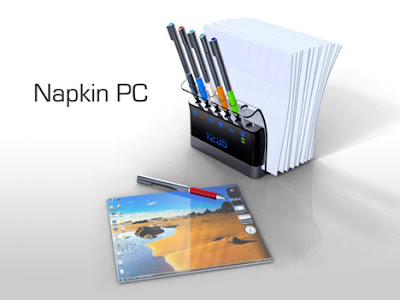
Highlights: Uses e-ink and RF technology, designed for group collaborations, has pens like modules that transmit info to the base station PC, processed info is displayed on the napkin which is actually e-ink paper.
3) Book Laptop by Kyle Bean

Highlights: it showcases the trend that we have become so dependent on technology and the virtual world, that we have forgotten about the REAL one that we live in.
2) B-membrane by Won-Seok Lee
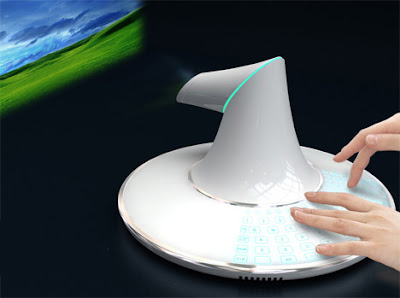
Highlights: built-in projector that removes the need for a separate monitor, a membrane keyboard that appears when needed, integrated optical drive, projector can beam ambient lights.
1) Sony Vaio Zoom Notebook Concept by Eno Setiawan

Highlights: thin glass form factor, touchscreen holographic technology, screen is completely transparent and the keyboard goes opaque when switched off.
10) MacBook Touch by Tommaso Gecchelin

Highlights: flexibility in form-factor via iSpine technology, flexible OLED screen, and Magic Dock that externalize ports to keep the appearance clean.
9) HP LiM (Less is More) Concept by Jeffrey S. Engelhardt

Highlights: use of Bamboo fabric across the aluminum frame of the PC, 19″ transparent touch OLED screen along with a wireless keyboard, virtual trackpad.
8 ) Evolve Modular CPU by Vas Obeyesekere of Point Innovation

Highlights: transforms between mobile and home computing configurations and can expand or contract its module based components to meet any user’s needs.
7) Mac Folder by Tryi Yeh

Highlights: a re-worked User Interface that resembles the iPod Touch or iPhones’, super-slim multi-touch screen.
6) Dual Screen Computer by Yong-Seong Kim

Highlights: a large slot behind the LCD display that can accommodate the notebook thus allowing you to use it as a desktop, notebook’s screen transforms into a second display in portrait mode.
5) Canvas by Kyle Cherry

Highlights: designed for those in the creative arts fields, offers a wide are for workspace.
4) The Napkin PC by Avery Holleman

Highlights: Uses e-ink and RF technology, designed for group collaborations, has pens like modules that transmit info to the base station PC, processed info is displayed on the napkin which is actually e-ink paper.
3) Book Laptop by Kyle Bean

Highlights: it showcases the trend that we have become so dependent on technology and the virtual world, that we have forgotten about the REAL one that we live in.
2) B-membrane by Won-Seok Lee

Highlights: built-in projector that removes the need for a separate monitor, a membrane keyboard that appears when needed, integrated optical drive, projector can beam ambient lights.
1) Sony Vaio Zoom Notebook Concept by Eno Setiawan

Highlights: thin glass form factor, touchscreen holographic technology, screen is completely transparent and the keyboard goes opaque when switched off.

No comments:
Post a Comment